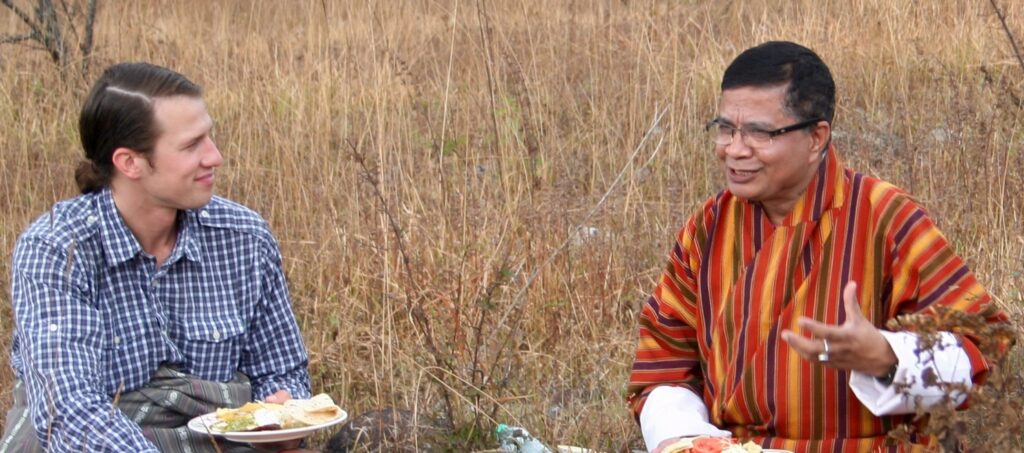
As I look back over our time in Bhutan, I am struck by the many stories, feelings, and conversations that make up my experience there. I remember walking near a river with a young teacher named Bhagat, talking about his small rural village school, the Bhutanese culture, and how to show respect according to social status. I remember learning to fold momos (dumplings) in Mr. Wangchuck’s house while the sounds of the televised Bhutan Broadcasting Service mixed with the sounds of Buddhist monks making music in the next room. I remember walking back into Samtse with Dr. Toshi one evening and listening to him laugh about playing the communication game “eyes, mouth, body” during the morning workshop. One young teacher, Tshewang, told me about his school, which is located in a remote village, requiring four hours of hiking beyond the end of the last road. He told me, “We see life and death each time we cross the river to our village.” There, Tshewang has been working to connect his students to their place by turning a nearby treehouse into an outdoor classroom. I have many more memories like these; in the end, connections to people and places add up to my sense of Bhutan.
 Alongside these unplanned moments, my attention while in Bhutan focused on data collection for my Master’s research, and now that I’ve returned to the University of Wyoming, this is what continues to dominate much of my thinking. The focus of my study is the impact of Teton Science Schools’ place-based education workshops on Bhutanese educators. Over 30 teachers, administrators, and college lecturers participated in my study. While my data analysis is not yet complete, I have already noticed one theme from my interviews, surveys, and observations: many of the educators’ reflections on the impacts of the workshops echoed my own experience in the TSS Graduate Program.
Alongside these unplanned moments, my attention while in Bhutan focused on data collection for my Master’s research, and now that I’ve returned to the University of Wyoming, this is what continues to dominate much of my thinking. The focus of my study is the impact of Teton Science Schools’ place-based education workshops on Bhutanese educators. Over 30 teachers, administrators, and college lecturers participated in my study. While my data analysis is not yet complete, I have already noticed one theme from my interviews, surveys, and observations: many of the educators’ reflections on the impacts of the workshops echoed my own experience in the TSS Graduate Program.  A number of the participants, both first-time and repeat workshop attendees, said that after adopting place-based education ideas into their teaching, they found that they also started to make new observations, ask more questions, and connect to their places in new, meaningful ways. They expressed feelings of pride for being involved in these workshops. They said that what they were learning from TSS was helping to make their work fun, engaging, and meaningful for them and their students. The more I listened to these teachers, and the more their words echoed my own, the more I felt as though I was among Bhutanese members of the TSS family.
A number of the participants, both first-time and repeat workshop attendees, said that after adopting place-based education ideas into their teaching, they found that they also started to make new observations, ask more questions, and connect to their places in new, meaningful ways. They expressed feelings of pride for being involved in these workshops. They said that what they were learning from TSS was helping to make their work fun, engaging, and meaningful for them and their students. The more I listened to these teachers, and the more their words echoed my own, the more I felt as though I was among Bhutanese members of the TSS family.
Travel Update: Multiple plane rides, layovers, and hours of travel are behind us now, and all three of us are safely home in Wyoming. We said goodbye to Mr. Wangchuck and Sangay from the Royal Education Council on January 26th and flew from Paro, Bhutan to Bangkok, Thailand. After a quick trip into the city for a Thai dinner and a restful night in the hotel, our team separated for the long return journey. Nate and Leslie headed to Jackson, and I am back in Laramie, at the University of Wyoming.


